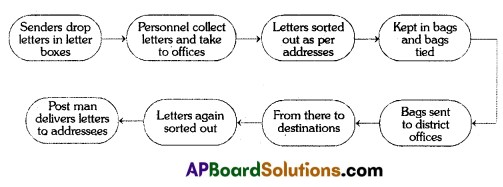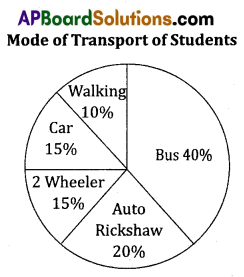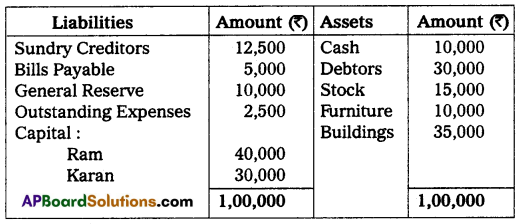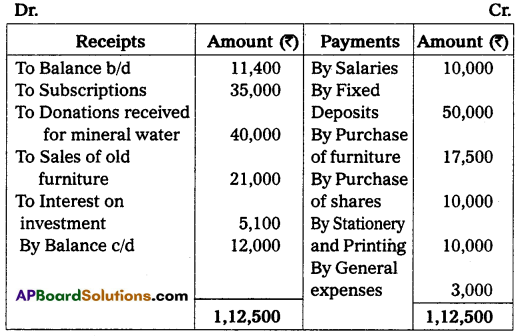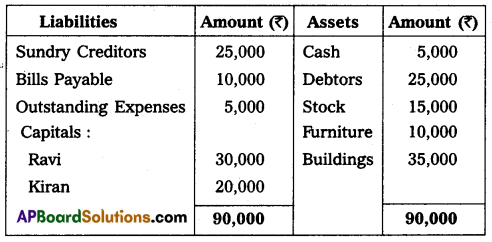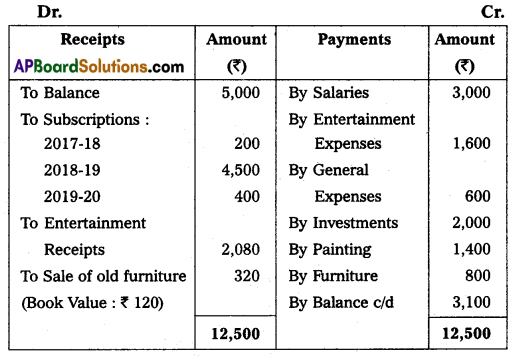Exploring a variety of TS Inter 1st Year Hindi Model Papers Set 1 is key to a well-rounded exam preparation strategy.
TS Inter 1st Year Hindi Model Paper Set 1 with Solutions
Time : 3 Hours
Maximum Marks: 100
सूचनाएँ :
- सभी प्रश्न अनिवार्य हैं ।
- जिस क्रम में प्रश्न दिये गये हैं, उसी क्रम से उत्तर लिखना अनिवार्य है ।
खंड- ‘क’
(60 अंक)
1. निम्न लिखित किसी एक दोहे का भावार्थ लिखिए । 1 × 6 = 6
सोना सज्जन साधुजन, दूटि जुटै सौ बार ।
दूर्जन कुंभ कुम्हार का, एकै धका दरार ॥
उत्तर:
भावार्थ: कबीरदास इस दोहे में “सज्जन के गुण” कैसे होते है इसके बारे में हमें बता रहे है। सोने को अगर सौ बार भी तोड़ा जाए, तो भी उसे फिर जोड़ा जा सकता है। इसी तरह भले मनुष्य हर अवस्था में भले ही रहते हैं । इसके विपरीत बुरे या दुष्ट लोग कुम्हार के घड़े की तरह होते हैं जो एक बार टूटने पर दुबारा नही जुड़ता । बुरे आदमी के स्वभाव हमेशा दूसरों की प्रती बुरा ही होता है ।
(अथवा)
तुलसी साथी विपत्ति के, विद्या, विनय, विवेक ।
साहस, सुकृति, सुसत्य क्रत, राम भरोसो एक ॥
उत्तर:
भावार्थ : तुलसीदास इस दोहे में “विधा, विनय, विवेक जैसे गुणों के महत्व” के बारे में बता रहे हैं । तुलसीदास जी कहते हैं कि विपत्ति में अर्थात मुश्किल वक्त में ये चीजे मनुष्य का साथ देती है, वे है ज्ञान, विनम्रता पूर्वक व्यवहार, विवेक, साहस, अच्छे कर्म, आपका सत्य और राम (भगवान) का नाम । विपत्ति के समय शिक्षा, विनय, विवेक, साहस, अच्छे कार्य और सच्चाई ही साथ देते हैं । ये सभी मुश्किलों से हमें बचाते हैं ।
![]()
2. किसी एक कविता का सारांश लिखिए । 1 × 6 = 6
(1) समता का संवाद
उत्तर:
हमारा देश भारत माता का मंदिर है । यहाँ सबलोग समान है और सबकी वाणी एक ही है । यहाँ पर सबका शुभ हो जाएगा और सभी को भारतमाता की कृपा मिलेगी ।
इसदेश में जाति, धर्म, संप्रदाय का कोई भेदभाव नही है । सभी को समान रूप में स्वागत किया जाता है और सब का समान आदर मिलजाता है। राम रहीम, बुद्ध, ईसा सबकी पूजा की जाती है । भिन्न-भिन्न संस्कृतियां होने पर भी सभी का समान गौरव और सभी से समान ज्ञान प्राप्त होता है । सभी लोग प्रेम को चाहते है, पर शत्रुता को नहीं । इसदेश में सभी का शुभ मंगल होगा और सबकी इच्छाएँ पूरी हो जाएँगी ।
इसदेश में अनेक तीर्थस्थल है । पर हम अपने हृदय को ही पवित्र बनाकर तीर्थस्थल बनाएँगे । यहाँ पर हम अजातशत्रु बनकर सब को मित्र बनाएँगे । हम अपने मन की रेखाओं से एक मित्र बनाते है । अनेक आदर्शों से हम अपने चरित्र का निर्माण करते है ।
भारत माता के समक्ष रहने वाले हम सब भाई – बहन है । हम सब उसी माँ के गोद से पले सन्तान है । हम सब लोग मिलकर सुख – दुख को बाँट देंगे। सभी का कल्याण होगा और सभी की इच्छाएँ पूरी हो जाएँगी ।
भारत माँ की सेवा में हम पूजारी है । उन्ही के कहने पर सब काम करते है । इस जीवन से लाभ उठाकर मुक्ति पाना हमारा कर्तव्य है । हम सब उसके अनुचर है । इस देश के करोडों लोग मिलकर भारतमाता का जयगान करेंगे । इस देश में हम सब का कल्याण होगा और हम सब पर उनकी कृपा रहेगी ।
इसप्रकार भारतदेश की महानता और भारतमाता को एक देवी के रूप में चित्रण करके उसके प्रति हमारा कर्तव्य निभाने का सन्देश कवि दे रहे है उनकी भाषा सरल खडीबोली है।
(2) दान – बल
उत्तर:
कवि का कहना है कि दान के देने से ही मानव जीवन निरंतर पूर्णरूप से आगे चलता है । दान बल से स्नेह ज्योति उज्वलित होती है। रोते हुए या हँसते हुए जो दान देते है, जो अहंकार में पड़कर दान देते है और जो अपने स्वत्व को त्याग मानते हैं, उसका कोई फल नहीं मिलता ।
वास्तव में त्याग देना स्वत्व का त्याग नही है, यह जीवन की सहज क्रिया मात्र है। जो अपनी संपत्ति को रोक लेता है वह जीवित रहते हुए भी मृतक के समान है । अर्थात् जो दूसरों को दान या मदद नहीं करते वह मरे हुए व्यक्ति के समान है । कवि वृक्ष का उदाहरण देते हुए कहते है कि वृक्ष किसी पर कृपा दिखाने के लिए फल नहीं देता है। यदि वृक्ष फल को गिरने से रोक देता है और ऋतु चले जाने के बाद भी फल डाल पर हो रखता है तो ये फल सड जाते है और उससे कीटाणु निकल कर डालों को ही नही, सारे वृक्ष को नाश कर देता है । इसलिए वृक्ष फल को त्याग देता है तो उसके बीजों से नसे पौधे पैदा होते है ।
नदी का उदाहरण देते हुए कवि कहते हैं कि नदि भी अपने पानी को नहीं रोकती है । नदी का पानी भाप बनकर बादलो का रुप लेता है और बरसकर पानी उसी नदी में मिल जाता है । इसलिए जो भी हम देते है उसका संपूर्ण फल हमें प्राप्त होता है ।
इस प्रकार कवि का मानना है कि दान एक प्राकृतिक धर्म है । दान देने मे मनुष्य व्यर्थ ही डरता है। हर एक को किसी न – किसी दिन सब छोडकर जाना ही है । इसलिए समय का ज्ञान समज़ेकर हमे सब कुछ समय पर दान देना चाहिए। नहीं तो जब मृत्यु आती है तो अपना सर्वस्व छोडकर भी लाभ नहीं मिलता ।
इस प्रकार दान देना मनुष्य का सहज स्वभाव होना चाहिए । यह कोई उपकार नहीं है । इस कर्तव्य को निभाना हमारा कर्तव्य है । उनकी भाषा सरल खडीबेली है ।
3. किसी एक पाठ का सारांश लिखिए । 1 × 6 = 6
(1) शिष्टाचार
उत्तर:
लेखक परिचय : ‘शिष्टाचार’ निबंध का लेखक रामाज्ञा द्विवेदी ‘समीर’ है । आप ‘समीर’ उपनाम से साहित्यक रचनाएँ करते थे । इनका सबसे बड़ा योगदान अवधी भाषा में निर्मित ‘अवधी शब्द ‘कोश’ था । आज भी हिंदी की उपभाषा अवधी से संबंधित किसी भी रचना को अच्छी तरह से समझने केलिए इस शब्दकोश का उपयोग किया जाता है। इसके अतिरिक्त उन्होंने कई फुटकल रचनाएँ भी की हैं ।
सारांश : ‘शिष्टाचार’ दो शब्दों ‘शिष्ट’ एवं ‘आचार’ के मेल से बना है । शिष्ट का अर्थ होता है – ‘सभ्य, उचित अथवा सही’ तथा आचार का अर्थ होता है – ‘व्यवहार’ । व्यक्ति को हर समय इस बात का ध्यान रखना चाहिए कि वह किससे बात कर रहा है, कहाँ बात कर रहा है एवं क्यों बात कर रहा है । सामान्य व्यवहार ही नही बातचीत करने के ढंग से भी व्यक्ति के व्यवहार का पता चल जाता है | इसलिए किसी भी बातचीत में शिष्टाचार के सामान्य नियमों का पालन करना चाहिए । यह भी ध्यान रखना चाहिए कि अलग अलग समाजों में शिष्टाचार के नियम भिन्न – भिन्न है यद्यपि उनके आधार प्रायः समान ही हैं ।
शिष्टाचार का सबसे पहला गुण है विनम्रता । हमारी वाणी में, हमारे व्यवहार में विनम्रता घुली होनी चाहिए | इसलिए किसी बड़े के बुलाने पर ‘हाँ’, ‘अच्छा’, ‘क्या’ न कहकर ‘जी हाँ’ या ‘जी नहीं’ कहना चाहिए | किसी की बात का उत्तर ऐसे नहीं देना चाहिए कि सुननेवालों के लगे कि लट्ठ मारा जा रहा है। विनम्र केवल बड़ों के प्रति नही होती। बराबर वालों और अपने से छोटों के प्रति भी नम्रता और स्नेह का भाव होना चाहिए। सभी से बोलते हुए हमारी वाणी में मिठास रहनी चाहिए, कटुता या कर्कशता नहीं । विनम्र केवल भाषा की वस्तु नहीं । हमारे कर्म में भी विनम्रता होनी चाहिए । अपने से बड़े व्यक्तियों के बैठ जाने के बाद ही हमें बैठना चाहिए। महिलाओं के प्रति हमारे व्यवहार में और भी विनम्रता का होना आवश्यक है । बस या रेल में किसी महिला को खड़ी देखकर अपनी सीट उन्हें बैठने केलिए दे देना शिष्ट आचरण है। बड़े लोगों के साथ चलते समय उनके आगे चलना भी अशिष्टता है। हाँ, उनकेलिए झट से आगे होकर दरवाज़ा खोल देना या राह दिखाना शिष्ट व्यवहार है ।
शिष्टाचार का दूसरा विशेष गुण है दूसरों की निजी बातों में दखल न देना । हर व्यक्ति का अपना एक निजी जीवन होता है । इसलिए हमें अकारण किसी से उसका वेतन, उम्र, जाति, धर्म आदि पूछने से बचना चाहिए । यदि कोई कुछ लिख रहा है, तो झाँक-झाँककर उसे पढ़ने की चेष्टा करना उजड्डपन कहा जाएगा। किसी के घर या दफतर जाने पर उसकी वस्तुओं को बिना पूछे उलटने – पुलटमे लगना अशिष्टता है । किसी का नाम लेने या लिखने के पहले श्री, श्रीमती या कुमारी लगाना अच्छी आदत है । कुछ लोग इनके स्थान पर पंडित, डॉक्टर, बाबू, लाला, मियाँ, मिर्ज़ा – जब जैसी आवश्यकता होती है । लगाते हैं । इसी तरह कुछ लोग नाम के बाद ‘जी’ लगाते हैं | यदि कोई कुछ कष्ट या असुविधा उठाकर हमारे लिए कोई काम करता है तो हमें उसके प्रति अपनी कृतज्ञता अवश्य प्रकट करनी चाहिए । इसका सबसे सरल तरीका है उसे धन्यवाद देना । यदि बस या रेल में कोई अपनी जगह हमें बैठने केलिए देता है तो उसे धन्यवाद अवश्य देना चाहिए |
शिष्टता का तीसरा आधार अनुशासन का पालन है । अनुशासन समाज के नैतिक नियमों का भी हो सकता है और कानून की धाराओं का भी । किसी मंदिर, गुरुद्वार या मस्जिद में जाने के पहले जूते उतार देना धार्मिक अनुशासन का पालन है। सड़क पर बाई ओर चलना या जहाँ जाना मना हो, वहाँ न जाना, कानून के अनुशासन का पालन है । हमें हर तरह के अनुशासनों का सामान्य ज्ञान होना ही चाहिए। जैसे किसी सभा में शोर मचाना अनुचित है । किसी वक्ता को अपनी बात कहने का मौका न देना अशिष्टता है । राष्ट्रगान के अवसर पर बैठे रहना या चलना या झूमना अशिष्ट व्यवहार है । जहाँ सब लोग बैठे हो वहाँ लेट जाना या पैर फैलाकर बैठना बहुत अनुचित है । अपने मन को संयम में रखना शिष्ट व्यवहार केलिए अत्यंत आवश्यक है |
संक्षेप में हम कह सकते हैं कि शिष्टाचार वह व्यवहार है जिसके करने पर दूसरों के तथा अपने मन को प्रसन्नता होती है । इसके विपरीत अशिष्ट व्यवहार से दूसरों का दिल दुखता है और उससे अंत में हानि भी होती है। एक बेहतरीन इंसान अपनी जुबान से ही पहचाना जाता है ।
विशेषताए :
- बड़ों का आदर सम्मान करना, अपने मित्रों एवं सहयोगियों के प्रति सहयोगात्मक रवैया, छोटों के प्रति स्नेह की भावना, सकारात्मक विचारधारा, स्थान-विशेष के अनुकूल व्यवहार इत्यादि शिष्टाचार के उदाहरण है । शालीनता एवं विनम्रता शिष्टाचार के ही घटक हैं ।
- सार्वजनिक स्थल पर धूम्रपान, किसी व्यक्ति से गाली-गलौज, अपने साथियों से अकड़कर बात करना, राह चलते किसी से बिना वजह झगड़ना इत्यादि अशिष्ट आचरण के उदाहरण है । Good manners and soft words have brought many a difficult thing to pass.
(2) बतुकम्मा
उत्तर:
1. प्रस्तावना (बतुकम्मा का अर्थ क्या है) : भारत त्यौहारों का देश है । यहाँ लगभग हर राज्य के अपने – अपने राज्य पर्व हैं । उसी तरह ‘बतुकम्मा’ तेलंगाणा राज्य का राज्य पर्व है । तेलंगाणा राज्य सरकार ने 24 जुलाई, 2014 के दिन सरकारी आदेश संख्या 2 के अनुसार इसे राज्य पर्व के रूप में गौरवान्वित किया है। हर वर्ष धूम-धाम, श्रद्धा और भक्ति के साथ मनाया जाने वाला त्योहार ही बतुकम्मा |
बतुकम्मा तेलुगु भाषा के दो शब्दों से बना है- ‘बतुकु’ और ‘अम्मा’ । यहाँ ‘बतुकु’ का अर्थ ‘जीवन’ और ‘अम्मा’ का अर्थ ‘माँ है। इस तरह बतुकम्मा का अर्थ है – ‘जीवन प्रदायिनी माता’ । बतुकम्मा त्यौहार तेलंगाणा राज्य की वैभवशाली संस्कृति का प्रतीक है । बतुकम्मा त्यौहार दशहरे की नवरात्रियों में मनाया जाता है । यह कुल नौ दिन का त्यौहार है । इसका आरंभ भाद्रपद अमावस्या यानी महालया अमावस्या या पितृ अमावस्या से होता है ।
2. पौराणिक गाथाएँ : वेमुलवाडा चालुक्य राजा, राष्ट्रकूट राजा के उप-सामंत थे, चोला राजा और राष्ट्रकूट के बीच हुए युद्ध में चालुक्य राजा ने राष्ट्रकूट का साथ दिया था । 973 AD में राष्ट्रकूट राजा के उपसामंत थैलापुदु द्वितीय ने आखिरी राजा कर्कुदु द्वितीय को हरादिया और अपना एक आजाद कल्याणी चालुक्य साम्राज्य खड़ा किया, अभी जो तेलंगाणा राज्य है, वो यही राज्य है । वेमुलवाड़ा के साम्राज्य के समय राजा राजेश्वर का मंदिर बहुत प्रसिद्ध था । तेलंगाणा के लोग इनकी बहुत पूजा आराधना करते थे । चोला के राजा परान्तका सुंदरा, राष्ट्रकूट राजा से युद्ध के समय घबरा गए थे। तब उन्हें किसी ने बोला कि राजाराजेश्वर उनकी मदद कर सकते थे, तो राजा चोला उनके भक्त बन गए । उन्होंने अपने बेटे का नाम भी राजराजा रखा। राजराजा चोला ने 985 – 1014 AD तक शासन किया। उनके बेटे राजेन्द चोला जो सेनापति थे, सत्यास्त्राया में हमला कर जीत हासिल की। अपनी जीत की निशानी के तौर पर उसने राजा राजेश्वरी मंदिर तुड़वा दिया और एकबड़ी शिवलिंग अपने पिता को उपहार के तौर पर दी । 1006 AD में राजराजा चोला इस शिवलिंग के लिए एक बड़े मंदिर का निर्माण शुरु करते है, 1010 में बृहदीश्वर नाम से मंदिर की स्थापना होती है, वेमुलावाडा से शिवलिंग को तन्जावूरु में स्थापित कर दिया गया, जिससे तेलंगाणा के लोग बहुत दुखी हुए।
तेलंगाणा छोड़ने के बाद बृहदम्मा (पार्वती) के दुःख को कम करने के लिए बतुकम्मा की शुरुवात हुई, जिस में फूलों से एक बड़े पर्वत की आकृति बनाई जाती है। इसके सबसे ऊपर हल्दी से गौरम्मा बनाकर उसे रखा जाता है। इस दौरान नाच, गाने होते है । बतुकम्मा का नाम बृहदम्मा से आया है। शिव व पार्वती को खुश करने के लिए ये त्यौहार 1000 साल से तेलंगाणा में बडी धूम धाम से मनाया जा रहा है । इसके अतिरिक्त एक पौराणिक कहानी भी है कहा जाता है कि चोल नरेश धर्मागंद और उनकी पत्नी सत्यवती के सौ पुत्र थे । वे सभी पुत्र एक महायुद्ध में मारे गए । इस दुख से उबरने के लिए राजा धर्मांगद और रानी सत्यवती ने कई पूजा-पाठ, यज्ञ आदि पूजन कार्य किए । फलस्वरुप उनके घर में साक्षात लक्ष्मीदेवी का जन्म हुआ । बचपन में घटी कई दुर्घटनाओं के बावजूद वह सुरक्षित बची रही । इसीलिए माता पिता ने उसका नाम ‘बतुकम्मा’ रख दिया । सभी लोग उसकी पूजा करना आरंभ किया ।
3. बतुकम्मा पर्व का महत्व : बतुकम्मा पर्व के पीछे एक खास उद्देश्य है, वर्षा ऋतु सभी जगह पानी आ जाता है, जैसे नदी, तालाब एंव कुँए भर जाते हैं, धरती भी गीली महिम सी हो जाती है और इसके बाद फूलों के रूप में पर्यावरण में बहार आती है । इसी कारण प्रकृति का धन्यवाद देने के लिए तरह- तरह के फूलों के साथ इस त्यौहार को मनाया जाता है, इसमें फोक रीजनल साँग अर्थात क्षेत्री गीत गाये जाते है । इन दिनों पूरे देश में ही उत्साह के पर्व मनाये जाते हैं, इन सबका उद्देश्य प्रकृति का अभिवादन करना ही होता है ।
4. बतुकम्मा पर्व कैसे मनाता और कैसे आचरण करता है : इस त्यौहार को मनाने के लिए नव विवाहित अपने मायके आती है। ऐसा कहा जाता हैं उनके जीवन में परिवर्तन के लिए यह प्रथा शुरु की गई.
a) पर्व के शुरुवाती पाँच दिनों में महिलाएँ अपने घर का आँगन स्वच्छ करती है, गोबर से आंगन को लिपा जाता है ।
b) सुबह जल्दी उठकर उस आँगन में सुंदर-सुंदर रंगौली डालती है ।
c) कई जगह पर एपन से चौक बनाया जाता है जिसमें सुंदर कलाकृति बनाई जाती है, चावल के आटे से रंगोली का बहुत महत्व है ।
d) इस उत्सव में घर के पुरुष बाहर से नाना प्रकार के फूल एकत्र करते हैं जिसमें तंगेडु, गुम्मडि पुव्वु, बंती, मंदारम, गोरिंटा, पोकाबंती, कट्लपाडु, गुंट्लागरगरा, चामंती, तामरा, गन्नेरु, गुलाबी, वज्रदंती, गड्डी पुव्वु आदि फूलों को एकत्र किया जाता हैं ।
e) फूलों के आने के बाद उनको सजाया जाता हैं । तरह-तरह की लेयर बनाई जाती हैं, जिसमें फूलों की पत्तियों को सजाया जाता है । इसे तांबालम (Thambalam) के नाम से जाना जाता है ।
f) बतुकम्मा बनना एक लोक कला है। महिलाएँ बतुकम्मा बनाने की शुरुवात दो पहर से करती है ।
आचरण (Celebration) :
a) नौ दिन इस त्यौहार में शाम के समय महिलाएँ, लड़कियाँ एकत्र होकर इस त्यौहार को मनाती हैं । इस समय ढोल बजाये जाते हैं ।
b) सब अपने- अपने बतुकम्मा को लेकर आती है ।
c) महिलाएँ पारंपरिक साड़ी और गहने पहनती है । लडकियाँ लहंगा चोली पहनती है ।
d) सभी महिलाएँ बतुकम्मा के चारों ओर गोला बनाकर क्षेत्रीय बोली में गाने गाती हैं, यह गीत एक सुर में गाये जाते हैं, इस प्रकार यह त्यौहार नौ दिनों तक मनाया जाता हैं। महिलाएँ अपने परिवार की सुख, समृद्धि, खुशहाली के लिए प्रार्थना करती है ।
e) हर एक दिन का अपना एक नाम है, जो नैवैद्यम (प्रसाद) के अनुसार रखा गया है ।
f) बहुत से नैवैद्यम बनाना बहुत आसान होता है, शुरु के आठ दिन छोटी बड़ी लडकियाँ इसे बनाने में मदद करती है ।
g) आखिरी दिन को सहुला बतुकम्मा कहते है, सभी महिलाएँ मिलकर नैवैद्यम बनाती है । इस अंतिम दिन बतुकम्मा को पानी में विसर्जित कर दिया जाता है ।
5. आनंद का पर्व : बतुकम्मा महीने भर समाज आनन्द – मग्न रहता है । नौ दिनों तक चलने वाले इस त्यौहार में स्त्रियों के करताल से सारा वातावरण गूंज उठता है। नीरस भी सरस बन जाता है। चारों तरफ हरियाली, पानी की भरपूर मात्रा, घर आँगन में खुशियों का वातावरण बनाये रखे । जीवन में महीने भर मानों आनन्द ही आनन्द बना रहता है ।
6. उपसंहार : भारत के सारे पर्वदिन आनन्द के ही त्योहार है । बतुकम्मा अधिक आनंदप्रद त्योहार है। रंक से लेकर रईस तक इसे मनाते हैं । बतुकम्मा त्योहार भारतीय समाज में स्त्रियों के गौरवशाली वैभव का गुणगान करता है । इस त्योहार से हमें यह पता चलता है, कि स्त्रियाँ न केवल ममता, प्रेम, समर्पण, त्याग की प्रतीक है, बल्कि समय आने पर समाज के हितों के लिए अपना सर्वस्व न्यौछावर करने के लिए तत्पर रहती है । यह त्योहार उस रूढिवादिता का विरोध करता है । जहाँ पुरुष को प्रधान माना जाता है । यह त्योहार स्त्री शक्ति को पहचानने, उनका आदर करने और समाज में उचिन स्थान देने पर बल देना है ।
“तेलंगाणा यदि शरीर है तो बतुकम्मा उसकी आत्मा । बतुकम्मा के बिना तेलंगाणा राज्य की कल्पना करना असंभव है” ।
![]()
4. किन्हीं दो प्रश्नों के उत्तर तीन या चार वाक्यों में लिखिए | 2 × 4 = 6
1) खड्गसिंह का चरित्र चित्रण कीजिए ।
उत्तर:
खड्गसिंह उस इलाके का प्रसिद्ध डाकू था । लोग उसका नाम सुनकर काँपते थे । होते-होते सुल्तान की कीर्ति उसके कानों तक भी पहुँची । वह एक दिन बाबा भारती के पास आया । उसने घोड़ा देखा, तो उसपर उसे बड़ा मोह हो गया। किसी न किसी सुल्तान को हड़पने की ठान ली । जाते-जाते उसने कहा- बाबाजी इस घोड़े को आपके पास रहने नही दूँगा ।
खड्गसिंह अपाहिज वेष धारण करके बाबा को धोखा दिया । घोड़े को अपना साथ ले गया । बाबा की करुण वचनों से अपना मन परिवर्तित होता है । अंत में उसने सुल्तान (घोड़े ) को बाबा तक पहुँचाता है । डाकू को भी हृदय होता है । डाकू भी सामान्य मानव जैसा सोचता है । इस प्रकार की आलोचना हमें खड्गसिंह चरित्र द्वारा मालूम होता है ।
2) रवींद्र का लक्ष्य क्या था ।
उत्तर:
रवींद्र एक छोटो से गाँव का लड़का था । गरीब परिवार का रवींद्र खुद अपने बलबूते पर पढ़ता
चला गया । हर परिक्षा में प्रथम रहता था । दसवी कक्षा में प्रथम आने पर रवींद्र का उत्साह दुगना हो गया और अधिक लगन से पढ़ने लगा । उसका एक मात्र लक्ष्य खूब पढकर आई.ए.एस बनना है । उसने अपना ध्यान आई. ए. एस की परीक्षा पास कर एक अधिकारी बनने पर केन्दित किया । अंत में कलक्टर बन जाता है ।
3) ध्यान चंद को ‘हाँकी का जादूगर’ क्यों कहा जाता है ?
उत्तर:
26 मई 1928 को ध्यानचंद समेत कई खिलाड़ियों की तबीयत खराब थी। लेकिन उनके हौंसलों
में किसी तरह की कमी नही थी। वो टीम वर्ल्ड चैम्पियन बन चुकी थी, जो उधार लेकर ओलंपिक खेलने आई थी । बर्लिन ओलंपिक में लोग मेरे हाँकी खेलने के ढंग से इतने प्रभावित हुए कि उन्होंने मुझे हाँकी का जादूगर कहना शुरु कर दिया । इसी ओलंपिक के बाद पहली बार ध्यानचंद के नाम के साथ ‘जादुगर’ शब्द जोडा गया ।
4) वनों को नष्ट करने से होनेवाले दुष्परिणामों के बारे में लिखिए ।
उत्तर:
वनों की कटाई से मिट्टी, पानी और वायु क्षरण होता है जिसके परिणामस्वरुप हर साल 16,400
करोड़ से अधिक वृक्षों की कमी देखी जाती है। वनों की कटाई भूमि की उत्पादकता पर विपरीत प्रभाव डालती है क्यों कि वृक्ष पहाडियों की सतह को बनाए रखने में एक महत्वपूर्ण भूमिका निभाते है तथा तेजी से बढती बारिश के पानी में प्राकृतिक बाधाएँ पैदा करते हैं। नतीजतन नदियों का जल स्तर अचानक बढ़ जाता है जिससे बाढ़ आती है। मिट्टी की उपजाऊ शक्ति की हानि होती है। वायु प्रदूषण होता है । प्रजातियां विलुप्त हो जाती है । ग्लोबल वार्मिगं हो जाता है । औषधीय वनस्पति प्राप्त करना दुर्लभ हो जाता है। ओजोन परत को नुकसान हो रहा है । जल संसाधन की कमी होती है ।
5. निम्नलिखित दो पद्यांशों की संदर्भ सहित व्याख्या कीजिए । 2 × 3 = 6
1) सब तीर्थो का एक तीर्थ यह …………… एक चरित्र बना ले हम |
उत्तर:
यह पद्य ‘समता का संवाद’ नामक कविता से लिया गया है । इसके कवि मैथिलीशरण गुप्त जी है । सब को आदर्शमय जीवन बिताने का सन्देश कवि देते हैं ।
कवि का कहना है कि हमारे देश मे अनेक तीर्थ स्थल है । उनके समान हमारे हृदय को भी पवित्र बनाएंगे । हम अजातशत्रु बनकर सबसे मित्रता करेंगे । हमारे मनोभावों को एक निश्चित रूप देंगे और उनसे हमारे चरित्र आदर्श बनाएंगे । कवि की भाषा सरल खडीबोली है ।
2) यह मेरी गोदी की शोभा, सुख सुहाग की है लाली । शाही शान भिखारन की है, मनोकामना मतवाली । दीप – शिखा है अंधकार की, बनी घटा की उजियाली । उषा है यह कमल भृंग की, है पतझड़ की हरियाली ।
उत्तर:
यह पद्य ‘बालिका का परिचय’ नामक कविता से लिया गया है । इसकी कवइत्री सुभद्रा कुमारी चौहान जी है । इसमे नारी चेतना का स्वर स्पष्ट होती है ।
कवइत्री कहती है कि बालिका मेरी गोद की शोभा है और सौभाग्य प्रदान करनेवाली है । वह मेरी मनोकामना का प्रतिफल है । माँ जितनी सम्पन्न होने पर भी बालिका के सामने भिखारिन ही है । वह अन्धकार में दीपशिखा की तरह, कालीघटा में प्रकाश की तरह है । वह पतझड की हरियाली में, कमल भौरों में उषा की पहली किरण जैसी है । अपनी बालिका हो जीवन का सूर्योदय है। उनकी भाषा सरल खडीबोली है ।
3) प्रथम रश्मि का आना रंगिणि, तूने कैसे पहचाना ?
कहाँ, कहाँ हे बाल विहंगिनि
पाया तूने वह गाना |
उत्तर:
यह पद्य ‘प्रथम रश्मि’ नामक कविता से लिया गया है । सुमित्रानंदन पंत इसके कवि है । सूर्योदय को सुन्दर वर्णन कवि इसमे कर रहे है । कवि इसमे बाल विहंगिनि से पूछ रहा है। अभी तुमने नींद से जाग लिया । तुम्हे प्रातः काल के किरणों की पहचान कैसे हुई ? यह जानकर तुम इतना सुन्दर केसे गा रही हो । प्रकृति की सहज सुन्दरता इसमे वर्णित है । भाषा सरल खडीबोली है ।
4) ऋतु के बाद फलों का रुकना डालों का सड़ना है, मोह दिखाना देय वस्तु पर आत्मघात करना है । देते तरु इसलिए कि रेशों में मत कीट समायें, रहें डालियाँ स्वस्थ और फिर नये नये फल आयें ।
उत्तर:
यह पद्य ‘दान – बल, नामक कविता से लिया गया हैं । यह कविता रश्मिरथी नामक काव्य से लिया गया है । इसके कवि श्री रामधारी सिंह दिनकर जी है ।
इसमे दान की महानता को व्यक्त करते हुए कवि वृक्ष का उदाहरण दे रहा है । वृक्ष ऋतु जाने के बाद स्वयं अपने फलों को छोड़ देती है। यदि नही छोडती तो वे फल डालों पर ही सड जाते है । उससे कीडे निकलकर सारा वृक्ष नाश हो जाता है । यदि फल को छोडता है तो उसके बीजों से नये पौधे और नये फल उत्पन्न होते है उसकी भाषा सरल खडीबोली है ।
![]()
6. निम्नलिखित किन्हीं दो गद्यांशों की संदर्भ सहित व्याख्या कीजिए । 2 × 3 = 6
(1) यदि कोई कुछ कष्ट या असुविधा उठाकर हमारे लिए कोई काम करता है तो हमें उसके प्रति अपनी कृतज्ञता अवश्य प्रकट करनी चाहिए ।
उत्तर:
संदर्भ : यह वाक्य ‘शिष्टाचार’ नामक पाठ से लिया गया है । यह पाठ एक सामाजिक निबंध है | इसके लेखक रामाज्ञा द्विवेदी ‘समीर’ जी हैं । वे ‘समीर’ उपनाम से साहित्यिक रचनाएँ करते थे | हिंदी के शब्द भंडार को समृद्ध करने की दृष्टि से उन्होंने ‘अवधी’ शब्दकोश का निर्माण किया था | इसके अतिरिक्त उन्होंने कई कुटकल रचनाएँ भी की हैं ।
व्याख्या : कुछ लोग खुद मुसीबतों में रहने पर भी, हम को सहायता करने आते हैं । उन लोगों के प्रति हम अपनी कृतज्ञता अवश्य प्रकट करनी चाहिए । कृतज्ञता कैसा प्रकट करना है यह बात हमारी मन में आता है । इसका सबसे सरल तरीका है उसे धन्यवाद देना । ‘धन्यवाद’ शब्द बोलते समय ऐसा लगना चाहिए कि हम उसे हृदय से धन्यवाद दे रहे हैं, केवल ऊपर-ऊपर से नहीं । जिस आदमी कष्ट में हमारी सहायता किया है उसको याद रखकर कभी उस आदमी को काम आने पर हमें भी उसकी सहायता करनी चाहिए ।
विशेषताएँ: प्रस्तुत निबंध ‘शिष्टाचार’ एक उपदेशात्मक निबंध है । धन्यवाद तभी बताना चाहिए कि जब किसी ने आपके लिए कुछ किया हो । जो कोई बात आपको मालुम नहीं, उसी बात को आप को समझाएँ तो धन्यवाद बताकर कृतज्ञता प्रकट करनी चाहिए। शिष्टाचार का सबसे महान गुण जो आज हम बच्चों को जरूर समझाना चाहिए कि राष्ट्रगान का आदर करना चाहिए |
(2) आखिर हम उठते हैं। लड़के से कहते हैं, “अच्छा अब हम जाते हैं । कह देना कि हम आए थे ।”
उत्तर:
संदर्भ : ये वाक्य ‘समय पर मिलने वाले’ नामक पाठ से दिये गये हैं । इस पाठ के लेखक ‘हरिशंकर परसाई’ जी हैं। आप हिंदी गद्य – साहित्य के व्यंग्यकारों में अग्रगण्य हैं । सामाजिक और राजनैतिक क्षेत्र में फैली विसंगतियों पर अपना लेख लिखता हैं । परसाई जी के व्यंग्यपरक निबंध पाठकों को सचेत करते हैं । प्रस्तुत पाठ एक व्यंग्य रचना है जिसमें एक व्यक्ति दूसरे व्यक्तियों के समय कैसा बरबाद करते है, इसका व्यंग्यपूर्ण चित्रण मिलता है ।
व्याख्या : एक दिन लेखक के मित्र लेखक से सुबह आठ बजे अपना घर पर मिलने का वादा किया था; पर मित्र घर पर नही हैं । लेखक मित्र केलिए उस का घर में इंतजार कर रहे हैं। मित्र के पुत्र लेखक के पास बैठकर पुस्तक पढ रहा है । बहुत देर तक रहने पर भी मित्र नही आता है । घर के अंदर से स्त्रियाँ लेखक के बारे में भला-बुरा कहता है । लेखक सभी बातें सुनकर लज्जित हो जाता है । अखिर उठ कर मित्र के पुत्र से कहते है, अच्छा मै अब जा रहा हूँ। तुम्हारे पिताजी आने के बाद कहदेना कि आपसे मिलने आपका दोस्त आया था |
विशेषताएँ :
- सामान्य आदमी समय को काटने के बारे में सोचता है, जबकि महान व्यक्ति सोचते हैं इसके उपयोग के बारे में ।
- दुनिया में जितनी भी चीजे हैं, उन सभी में समय समाया हुआ है ।
(3) मेधावी पुत्री की विलक्षण बुद्धि ने फिर मुझे चमत्कृत कर दिया है। सरस्वती जैसे आकर जिह्वाग्र पर बैठ गयी थी ।
उत्तर:
संदर्भ : यह वाक्य ‘अपराजिता’ नामक कहानी से दिया गया है। इसकी लेखिका ‘गौरा पंत शिवानी’ जी है । भारत सरकार ने सन् 1982 में उन्हे हिंदी साहित्य में उत्कृष्ट सेवा के लिए पद्ममश्री पुरस्कार से सम्मानित किया । शिवानी जी की अधिकरतर कहानियाँ और उपन्यास नारी प्रधान रहे । प्रस्तुत कहानी अपराजिता में लेखिका ‘डाँ. चंद्रा’ नामक एक अपंग युवती की जीवन संबंधी विषयों के बारे में हमें बतायी ।
व्याख्या : डॉ. चंद्रा की माँ श्रीमती टी. सुब्रह्मण्यम चंद्रा के बारे में इस तरह कह रही है कि “चंद्रा को अठारह वे महीने में ज्वर आया । बाद में पक्षाघात हुआ । गरदन के नीचे सर्वांग अचल हो गया था । बड़े-से-बड़े डाक्टर को दिखाया, कोई लाभ नही हुआ। अंत में एक सुप्रसिद्ध आर्थोपेडिक के पास लेगया । एक वर्ष तक कष्टसाध्य उपाचार चला । अचानक एक दिन चंद्रा की ऊपरी धड़ में गति आगयी” । पाँच वर्ष तक (टी श्रीमती सुब्रह्मण्यम ) माँ ही बेटी को शिक्षिका बनकर पढायी । चंद्रा बहुत मेधावी थी। चंद्रा की विलक्षण बुद्धि को देखकर अपनी माँ आश्चर्य हो जाती थी। स्वयं सरस्वती ही चंद्रा की जिह्वा पर बैठी थी ऐसी सोचती थी। चंद्रा एक बार सुनती तो कभी नही भूलती थी । चंद्रा ‘एकाग्रचित ‘ थी ।
विशेषताएँ :
- अपंगों को शिक्षा से जोड़ना बहुत जरूरी है ।
- शिवानी की कृतियों में चरित्र – चित्रण में एक तरह का आवेग दिखाई देता है ।
- डाँ. चंद्रा जैसे अपंग युवती सबकी मार्गदर्शिका है ।
(4) रूई की पतली पत्ती दूध से भिगोकर जैसे- जैसे उसके नन्हें से मुँह में लगाई पर मुँह खुल न सका और दूध की बूँदे दोनों ओर दुलक गई ।
उत्तर:
संदर्भ : यह वाक्य ‘गिल्लू’ नामक पाठ से दिया गया है । इस पाठ की लेखिका ‘श्रीमती महादेवी’ वर्मा है । आप हिन्दी साहित्य के आधुनिक काल में छायावाद युग की प्रसिद्ध कवइत्री एवं ख्यातिप्राप्त गद्य – लेखिका है । आपको ‘आधुनिक मीराबाई’ कहा जाता है । ‘नीहार’, ‘नीरजा’, ‘रश्मि’, ‘सन्ध्यागीत’, आदि आपके काव्य है। ‘स्मृति की रखाएँ’, ‘अतीत के चलचित्र’, ‘रटंखला की कडियाँ’ आदि आपकी प्रख्यात गद्य रचनाएँ हैं । आपको ‘यामा’ काव्य पर भारतीय ज्ञानपीठ का पुरस्कार प्राप्त हुआ । प्रस्तुत पाठ में एक छोटी जीव की जीवन का चित्रण करती हैं |
व्याख्या : महादेवी वर्मा के घर में एक दिन बरामदे से तेज आवाज आने लगी । तब लेखिका बाहर आकर देखती है । दो कौए गिलहरी को खाने का प्रयत्न करते हैं । लेखिका उस छोटे जीव को कौओं से बचाकर घर के अंदर ले आती है । गिलहरी के शरीर पर हुए घावों पर पेंसिलिन मरहम लगाती है | उसे खिलाने या पिलाने की प्रयत्न करती है। दूध पिलाने केलिए रूई को दूध से भिगोकर, उसके नन्हे से मुँह में लगाती है, पर मुँह खुला सका । तब दूध की बूँदे ढुलक जाती है । अंत मैं कई घंटे के बाद उसके मुँह में टपकाया जाता है । गिलहरी को बचाने के लिए बहुत प्रयास करती है ।
विशेषताएँ :
- किसी भी प्राणी आपत्ति में रहने पर उसकी सहायता करना हमारा कर्तव्य है ।
- छोटे जीवों के प्रती भी लेखिका के मन में करुण भावना है ।
- कई घंटे उस छोटी जीव की उपचार करती रही, अंत में सफल हुई |
7. किन्हीं दो प्रश्नों के उत्तर लिखिए | 2 × 3 = 6
1) तुलसी के अनुसार मीठे वचन बोलने से क्या लाभ हैं ?
उत्तर:
तुलसी के अनुसार मीठे वचन बोलने से चारों ओर खुशियाँ फैल जाती हैं सब कुछ खुशहाल रहता है। मीठी वाणी से कोई भी इंसान किसी को भी अपने वश में कर सकता है। शत्रु को भी अपना मित्र बनाते है |
मधुर वाणी सभी ओर सुख प्रकाशित करती है और यह हर किसी को अपनी ओर सम्मोहित करने का कारगर मंत्र है | इसलिए हर मनुष्य को कटु वाणी त्याग कर मीठे बोल बोलना चाहिए ।
2) माँ के लिए बेटी किसके समान है ?
उत्तर:
माँ के लिए बेटी गोदी की शोभा है और सौभाग्य प्रदान करती है। वह अपने अंधकारमय जीवन के लिए दीपशिखा की तरह है । माँ जीवन मन उषा की पहली किरण है । नीरस मन में अमृत की धारा और रस भरने वाली है – वह बालिका नष्ट नयनों की ज्योति है और तपस्वी को मन की सच्चीलगन है । एक माँ के लिए उसकी अपनी संतान है सबकुछ होती है । माँ और बेटी में भेद न करने की भावना समाज को उन्नति के शिखर पर पहुँचा सकती है ।
3) कवि ने प्रातः काल का वर्णन किस प्रकार किया है ?
उत्तर:
पंत जी ने प्रातः काल का सुन्दर वर्णन किया है । उषा काल मे सूरज की प्रथम किरण धरती को छूने से कितने सुन्दर परिवर्तन होते है, उनका सुन्दर वर्णन किया है । सूर्योदय के स्वागत में नन्ही सी पक्षी की मधुर आवाज मे गाना, नन्ही सी कलियों का चन्द्रके किरण तितलियों के रूप मे स्पर्श करने से मुस्कुराना, रात के चमकीले तारे मन्द पड़ जाना, सूर्योदय के स्वागत करते हुए कोयल का गाना सभी का सुन्दर वर्णन करके कवि यह प्रश्न कर रहा है कि सुर्योदय के आगमन के बारे मे इन सबको कैसा पता चल रहा है ।
4) फलों का दान करने से पेड़ को क्या लाभ होता हैं ?
उत्तर:
दान देना एक स्वाभाविक प्रक्रिया है । इसका समर्थन करते हुए कवि कहते है । कि वृक्ष फल देता है । यह कोई दान नहीं है । यदि ऋतु जाने के बाद वृक्ष फल को नहीं छोडता है तो फल उसी डाल पर सड़ जाते है । इससे कीडे निकलकर सारा वृक्ष नाश हो जाता है । यदि वृक्ष फल को गिरा देता है तो फिर नए फल आते है और उस फल के बीजों से नये पौधों उत्पन्न होते है ।
![]()
8. किन्हीं दो प्रश्नों के उत्तर लिखिए | 2 × 3 = 6
1) शिष्टाचार के कितने गुण हैं, वे कौन कौन से हैं ?
उत्तर:
शिष्टाचार के मुख्यतः तीन गुण हैं। वे हैं विनम्रता, दूसरों की निजी बातों में दखले न देना, अनुशासन ।
शिष्टाचार का सबसे पहला गुण है, विनम्रता । हमारी वाणी में, हमारे व्यवहार में विनम्रता धुली होनी चाहिए । इसलिए किसी बड़े के बुलाने पर ‘हाँ’, ‘अच्छा’, ‘क्या’ न कहकर ‘जीहाँ’ (या) जीनही कहना चाहिए । विनम्रता केवल बडों के प्रति नहीं होनी चाहिए । बराबरवालों और अपने से छोटों के प्रति भी नम्रता और स्नेहकाभाव होना चाहिए ।
शिष्टाचार का दूसरा विशेष गुण है दूसरों की निजी बातों में दखल न देना । हर व्यक्ति का अपना एक निजी जीवन होता है । इसीलिए हमें अकारण किसी से उसका वेतन, उम्र, जाति, धर्म आदि पूछने से बचाना चाहिए । यदि कोई कुछ लिख रहा है तो झाँक झाँक कर उसे पढ़ने की चेष्टा करना अच्छा नहीं है ।
शिष्टाचार का तीसरा आधार अनुशासन का पालन है । अनुशासन समाज के नैतिक नियमों का भी हो सकता है और कानून की धाराओं का भी । जहाँ जाना मना हो, वहाँ न जाना, कानून के अनुशासन का पालन है । ठीक समय पर कहीं पहुँचना अनुशासन भी सिखाता है ।
2) हरिशंकर परसाई की रचनाओं के नाम लिखिए ।
उत्तर:
हरिशंकर परसाई की प्रमुख रचनाएँ इस प्रकार हैं ।
निबंध संग्रह : तब की बात और थी, भूत के पाँव पीछे, बेईमानी की परत, पगडंडियों का जमाना, सदाचार का ताबीज, वैष्णव की फिसलन, माटी कहे कुम्हार से शिकायत मुझे भी है और अंत में, अपनी अपनी बिमारी, आवारा भीड़ के खतरे – ऐसा भी सोचा जाता है आदि उनके उल्लेखनीय निबंध संग्रह हैं ।
कहानी संग्रह : जैसे उसके दिन फिरे, दो नाकवाले लोग, हसते हैं रोते हैं, भोलाराम का जीव ।
उपन्यास : तट की खोज, रानी नागफनी की कहानी, ज्वाला और जल उनके प्रसिद्ध उपन्यास हैं ।
3) चंद्रा की माँ को ‘वीर जननी’ का पुरस्कार क्यों दिया गया ?
उत्तर:
चंद्रा की माँ श्रीमती टी. सुब्रह्मण्यम थी । वह एक साहसी जननी है । चंद्रा की माध्यमिक और काँलेज शिक्षा में बेटी के साथ रहकर पूरी कक्षाओं में अपंग पुत्री की कुर्सी की परिक्रमा स्वयं कराती । बचपन में चंद्रा को देखकर अपनी आत्मशक्ति खो नही बेठी । अपने आप को संभाल कर चंद्रा को भी संभाली। हर एक पल बेटी की कामना पूरी करने की कोशिश किया । चंद्रा की माँ अपने सारे सुख त्यागकर, नित्य छायाबनी । आज चंद्रा जो कुछ नाम प्राप्त किया सबकी वजह उसकी माँ ही है । इसलिए जे. सी. बेंगलूर उसकी माँ को ‘वीर जननी’ का पुरस्कार दिया । सचमुच चंद्रा की माँ एक वीर जननी है।
4) गिल्लू किसका नाम है ? उसके बारे में आप क्या जानते हैं ?
उत्तर:
गिल्लू एक ‘गिलहरी का नाम है । सोन जूही में लगी पीली कली को देखकर लेखिका के मन में छोटे से जीव गिलहरी की याद आ गई, जिसे वह गिल्लू कहती थी। बचपन में लेखिका गिल्लू को कौओं से बचाती हैं | अपना घर में गिल्लू को रखती थी । गिल्लू केलिए एक हलकी डलिया लेकर, उसके अंदर रूई बिछाकर उसे तार से खिडकी पर लटका दिया । यह रही गिल्लू का घर । गिल्लू डलिया को स्वयं हिलाकर झूलता रहता था । गिल्लू की झब्बेदार पूँछ और चंचल चमकीली आँखे सबको विस्मित करते थे । जब लेखिका लिखने बैठती तब पैर तक आकर शोर मचाती थी । लेखिका गिल्लू को लंबे लिफाफे में रख देती थी। दो पंजों और सिर के अतिरिक्त सारा लघुगात लिफाफे के भीतर बंद रहता । बाहर सी गिलहरियों से खेलने जाती थी । लेखिका बाहर जाने के लिए गिल्लू के लिए मार्ग बनाती थी । गिल्लू दो वर्ष तक लेखिका के साथ रहती थी । परंतु एक दिन प्रभात की प्रथम किरण के स्पर्श के साथ ही वह किसी और जीवन में जागने केलिए सो गया। सुबह होते – होते गिल्लू की मृत्यु हो गई ।
9. एक शब्द में उत्तर लिखिए । 5 × 1 = 5
1) कबीरदास किस शाखा के प्रमुख कवि थे ।
उत्तर:
निर्गुण भक्ति शाखा ।
2) तुलसीदास के माता पिता का नाम लिखिए ।
उत्तर:
हुलसी और आत्मराम दुबे |
3) प्रथम रश्मि कविता मे पक्षियों के घोसलों के पास कौन पहरा दे रहे थे ।
उत्तर:
प्रथम रश्मि कविता में पक्षियों के घोसलों के पास जुगुनू पहरा दे रहे थे ।
4) समता शब्द का अर्थ क्या है ।
उत्तर:
समता शब्द का अर्थ समानता या बराबरी है ।
5) गोदी की शोभा कौन है ।
उत्तर:
माँ की गोदी की शोभा अपनी बेटी ही है ।
10. एक शब्द में उत्तर लिखिए । 5 × 1 = 5
1) परसाई जी के मित्र ने उन्हें कितने बजे खाने पर बुलाया ?
उत्तर:
परसाई जी के मित्र ने उन्हें 11 बजे खाने पर बुलाया ।
2) सेठ जी के बेटे का नाम क्या है ?
उत्तर:
बलराम ।
3) ‘अपराजिता’ पाठ की लेखिका का नाम क्या है ?
उत्तर:
गौरा पंत “शिवानी” जी है।
4) राजा धर्मागद की पत्नी का नाम क्या था ?
उत्तर:
सत्यवती ।
5) समाज में सभ्य बनकर रहने के लिए कौनसे नियम जनना आवश्यक है ?
उत्तर:
शिष्टाचार |
![]()
खंड – ‘ख’
(40 अंक)
11. निम्नलिखित गद्यांश पढ़ित । प्रश्नों के उत्तर एक वाक्य में लिखिए । 5 × 1 = 5
यह नितांत एक मूर्खता है कि हम प्रगति के नाम पर अपने वनों को नष्ट कर रहे हैं और पारिस्थितिक संतुलन को बिगाड़ रहे हैं । व्यापक स्तर की दूरगामी योजनाओं के अभाव में शहरीकरण ने अनेक शहरी तथा उपशहरी क्षेत्रों को व्यावसायिक जंगलों में बदल दिया है । जमीन के इस गलत उपयोग का एक गंभीर परिणाम है विभिन्न प्रकार के जीवों की समाप्ति । शहरों की वृद्धि कृषि के प्रसार, बाधों के निर्माण तथा वनों के विनाश से जंगली जीवों के आवास नष्ट हुए है । जीवों की बहुत सी प्रजातियों और उपप्रजातियों के विलुप्त होने का खतरा उत्पन्न हो गया है ।
प्रश्न :
1) वनों को काटना कैसा काम है ?
उत्तर:
वनों को काटना मूर्खता वाला काम है ।
2) यहाँ किस संतुलन के बारे में चर्चा हो रही है ?
उत्तर:
यहाँ पारिस्थितिक संतुलन के बारे में चर्चा हो रही है ।
3) किसके गलत उपयोग से गंभीर परिणाम होते हैं ?
उत्तर:
जमीनों के गलत उपयोग से गंभर परिणाम होते हैं ।
4) किनके आवास नष्ट हुए हैं ?
उत्तर:
जंगली जीवों के आवास नष्ट हुए हैं ।
5) इस अनुच्छेद के लेखक का नाम क्या है ?
उत्तर:
इस अनुच्छेद के लेखक का नाम एन मणिवासकम है ।
12. सूचना के अनुसार लिखिए । 8 × 1 = 8
(12.1 ) किन्हीं चार (4) शब्दों के विलोम शब्द लिखिए ।
(1) इच्छा
(2) राजा
(3) घृणा
(4) स्वर्ग
(5) कठिन
(6) उषा
उत्तर:
(1) इच्छा × अनिच्छा
(2) राजा × रंक
(3) घृणा × प्रेम
(4) स्वर्ग × नरक
(5) कठिन × सरल
(6) उषा × संध्या
(12.2 ) किन्हीं चार (4) शब्दों के समानार्थी शब्द लिखिए ।
(1) घोड़ा
(2) पेड
(3) क्रोध
(4) नदी
(5) राजा
(6) आँख
उत्तर:
(1) घोड़ा = अश्व, हथ, वाजि, घोटक, तुरंग, तुरंगम
(2) पेड = वृक्ष, तरु, झाड़, विटप
(3) क्रोध = रोष, गुस्सा, अमर्ष, नाराजगी
(4) नदी = सरिता, तटिनी, तरंगीणी, निर्झरिणी, सलिला
(5) राजा = नृप, नृपति, सम्राट, नरेश
(6) आँख = लोचन, नयन, नेत्र, चक्षु, दूग, विलोचन
![]()
13. किन्हीं आठ (8) शब्दों की शुद्ध वर्तनी लिखिए । 8 × 1 = 8
(1) भारथ
(2) बोजन
(3) हीन्दी
(4) पच्चिस
(5) गूण
(6) पूजारी
(7) आदमि
(8) इमलि
(9) धोका
(10) भूक
(11) सीक
(12) कन
उत्तर:
(1) भारथ – भारत
(2) बोजन – भोजन
(3) हीन्दी – हिंदी
(4) पच्चिस – पच्चीस
(5) गूण – गुण
(6) पूजारी – पुजारी
(7) आदमि – आदमी
(8) इमलि – इमली
(9) धोका – धोखा
(10) भूक – भूख
(11) सीक – सीख
(12) कन – कण
14. कारक चिह्नों की सहायता से रिक्तस्थानों की पूर्ति कीजिए । 8 × 1 = 8
1) वह बाज़ार …………… (में/से) सब्जी लाया ।
2) रामू …………….. (का / की) घर है ।
3) लड़के …………….. (ने / पर) पुस्तक पढ़ी |
4) ………….. ( राय / वाह) । वह बुरी तरह से घायल हो गया ।
5) पेड़ ………… ( से / के द्वारा ) पत्ता गिरा ।
6) लड़के ………….. (की / को) यहाँ बुलाओ ।
7) कक्षा में एक …………… ( पर / से) बढ़कर एक छात्र हैं ।
8) छत …………. (के लिए / पर) पंखा लटका हैं ।
उत्तर:
1) वह बाज़ार से सब्जी लाया ।
2) रामू का घर है ।
3) लड़के ने पुस्तक पढ़ी ।
4) वाह वह बुरी तरह से घायल हो गया |
5) पेंड़ से पत्ता गिरा ।
6) लड़के को यहाँ बुलाओ ।
7) कक्षा में एक से बढ़कर एक छात्र हैं ।
8) छत पर पंखा लटका हैं ।
15. निर्देश के अनुसार छ: (6) वाक्यों को शुद्ध कीजिए । 6 × 1 = 6
1) तुम चाय पीता है । (वाक्य शुद्ध कीजिए 1)
उत्तर:
तुम चाय पीते हो ।
2) पण्डिताइन मंदिर जा रही है। (रेखांकित शब्द का प्रत्यय लिखिए ।)
उत्तर:
आइन
3) नौकर बाज़ार गयी है । (रेखांकित शब्द का लिंग बदलकर लिखिए ।)
उत्तर:
नौकरानी बाजार गयी है ।
4) वातावरण अपकूल हैं । (रेखांकित शब्द का उपसर्ग लिखिए ।)
उत्तर:
अप
5) मै खेलता हूँ । (भविष्यत् काल मैं लिखिए ।)
ज.
मै खेलूँगा ।
6) ये राजु के घरों हैं । (रेखांकित शब्द का वचन बदलकर लिखिए ।)
उत्तर:
ये राजु के घर हैं |
7) तू तेरे भाई के साथ खेल । (वाक्य शुद्ध कीजिए 1)
उत्तर:
तू अपने भाई के साथ खेल ।
8) वह चतुरिक से काम करता है । (शुद्ध कीजिए ।)
उत्तर:
वह चतुरता से काम करता है ।
![]()
16. किन्हीं पाँच (5) वाक्यों का हिंदी में अनुवाद कीजिए । 5 × 1 = 5
1) I have read this book.
उत्तर:
यह किताब मै ने पढ़ी है ।
2 ) Bring those books.
उत्तर:
उन किताबो को लाओ ।
3) Does he eat ?
उत्तर:
क्या वह खाता है ?
4) I have got my haircut.
उत्तर:
मैं ने अपने बाल कटवाये हैं ।
5) I read.
उत्तर:
मै पढता हूँ ।
6 ) I prefer cricket to football.
उत्तर:
मै फुटबाल से क्रिकेट को अधिक पसंद करता हूँ |
7) He has finished writing a story.
उत्तर:
वह कहानी लिख चुका ।
8) You sit there.
उत्तर:
तुम वहाँ बैठो ।





